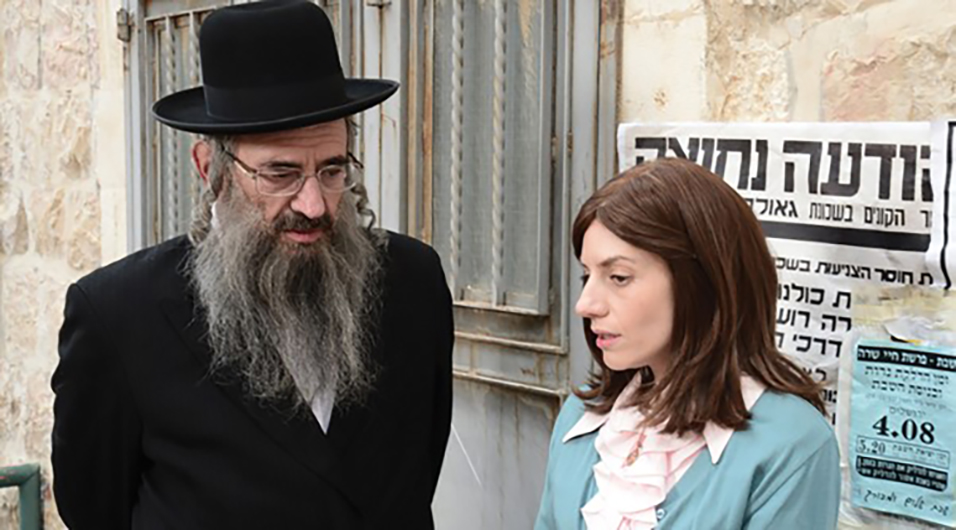
Israel

Becoming Giti in a global hit series “no-one would watch”
Award-winning Israeli actress Neta Riskin repeatedly turned down the chance to take on the role of Giti in Shtisel because she was no fan of the ultra-Orthodox in Israel. However, it took just one night reading the script for her to fall in love with this Israeli series, particularly the part of Giti.
So much so, she took it on believing that the show wouldn’t attract much of an audience. She and the cast and crew were astonished that it became an international hit after being told, time and again, that few would watch it.
“I’m always shocked to hear people talking about Shtisel,” she told an audience of Jewish journalists from around the world at the Jewish Media Summit in Jerusalem in December.

But, had the casting director not persisted, she would never have taken part in the show.
“Israel is a polarised society,” Riskin said. “There’s an eternal clash between religious and secular communities, and I belong to one side of the map, which is why I was so reluctant to take on this role.”
Besides, she said, the idea of wearing “those wigs, those thick stockings, and full attire” to film through summer seemed like sheer madness. But she took it on because “it was the best script I had ever read”.
“It may be about an ultra-Orthodox family in Mea Shearim in Jerusalem, but it’s about human beings, not religion. The main themes are longing, greed, and restraining one’s desires. The cultural restraints of the show make it artistically more interesting.”
But learning to be Giti wasn’t easy. She had a coach help her, and one of the first things Riskin asked was, “What should I believe in?” She was told it wasn’t about belief, but how you live and behave.
The coach made Riskin demonstrate how she walked, only to be told that she “exists too much” in her walking, and needed to “minimise” herself.
Riskin asked questions about playing this mother of five whose husband leaves to work in Argentina to make some money and vanishes. She lives with rumours about him having an affair with a “goya” (non-Jewish woman), and fears he’s lost his faith.
“[The coach] crushed me and my questions, telling me it was none of my business,” recalled Riskin. “She told me anything that you will be asked from this day on, you will answer with only two words: “Baruch Hashem”. This is your answer to any questions.”
For Riskin, this wasn’t easy, coming from a society in which she says, “We talk about everything. And if we aren’t able to talk about it, we seek professional help from someone who will make us get those words out of our mouths. If that doesn’t work, we either split or get divorced because we’re unable to solve our problems with words.
“Shtisel is a show based on two people talking to each other and doing their best to say nothing. They hold everything deep inside. So Shtisel is based entirely on subtext.”
What’s also rare, she says, is that it is a series that became an international hit without any dead bodies, sex, or violence.
“Most people in this industry believed that it had nothing to draw an audience. We were told upfront by the channel’s public-relations officer that she couldn’t promote Shtisel because she had nothing to work with. So, Shtisel’s entire success was through word of mouth and some good reviews. Even the fact that it was half in Yiddish was believed to be off-putting.”
Riskin says that when you meet Giti, you see a woman who appears to be discarded and weak in having lost her husband, but you learn that she has a deep strength and mettle. “Giti won’t be pitied by anyone, knowing well how to make the most of what she has, and can be threatening when things don’t align with her will.”
Riskin says that for thousands of years, stories were mostly about men who travelled the world on their adventures, fought wars, had love affairs, and came back to big home comings. The women in these stories waited at home for their return, and were passive, uninteresting characters. Lately, she says, we see more stories of women on adventures, but in Shtisel, this is flipped around. “Giti plays the woman waiting at home while the man is on his great adventure, but the focus is on her not him.
“So, Lippe (Giti’s husband) goes on his adventures, having affairs, experiencing internal conflicts, and losing his religion,” she says. “We just know shreds of information about it. We never know his real story because it was a script decision that his story wasn’t the important one.”
So much so, that after not knowing his whereabouts for 11 episodes, Lippe comes back and wants to tell Giti what happened, but she refuses to listen to him.
When Riskin asked one of the writers why Giti does this, “He quoted Rabbi Nachman who apparently said, ‘Searching for the truth is like peeling an onion. You take off layer after layer to find another layer and, in the end, all you are left with are tears. So what’s it good for?’.
“So, while not asking wasn’t natural for me, I realised that by doing this, he doesn’t get to own the narrative and there’s only one version – Giti’s – ensuring that she holds the power,” says Riskin.
Not communicating verbally is just one of the restraints in Shtisel. There were more. “We can’t touch each other. We can’t sit in certain ways. We can’t say certain things. These things charge the simplest story with conflict. The truth is that if it wasn’t an Orthodox family, there would be no problem getting divorced. No-one would have a problem studying what they wanted to or choosing to be an artist, or marrying the woman they love. The surrounding is what gives the story built-in conflict,” Riskin says.
“But it’s difficult not having physical contact, with very strict rules about showing affection and empathy.”
She recalls the scene when she’s giving birth, and how they had to be creative in showing Lippe’s love for her when he couldn’t be in the same room. So, she asks him to sing a song that will soothe her over the phone and, while she’s in an agonising labour, she listens to his voice.
With all their creativity, the belief persisted that Shtisel had no audience appeal. “It became a standing joke whenever one of us didn’t like a scene we did because we had little budget or time to redo it. We even had T-shirts made about it.”
Once the show aired, word got out, and people started watching and enjoying it. Shtisel went on to win every category at the Israeli Academy Awards. Even after that, the producer told the cast and crew not to expect too much because, she said, “It was a piece of art we did for ourselves.” But its popularity grew and grew among young, old, secular, and ultra-Orthodox. “This is a phenomenon, because the ultra-Orthodox don’t watch television, but they started to watch on their cell phones. It’s unheard of that we consume the same cultural products, but it happened,” says Riskin.
“In a very modest way, we managed to cross some kind of uncrossable bridge and engage each side in dialogue without words. This is Shtisel’s biggest achievement in Israel.”
As for attracting an international audience, Riskin says, “The more targeted you are in aiming the arrow to the heart, the more it reaches every heart in the room. Shtisel is authentic in being about something specific. We didn’t try and look or sound like anything else.
“People clearly want to see something they haven’t seen before. Also, every character in Shtisel is flawed and, although they have the best intentions, what they do usually turns out badly. People identify with their intention, compassion, and goodwill on the way to disasters,” Riskin says.
Even knowing about Shtisel’s international success, Riskin was clearly astonished to find that everyone in the room of international journalists were fans of the series.






